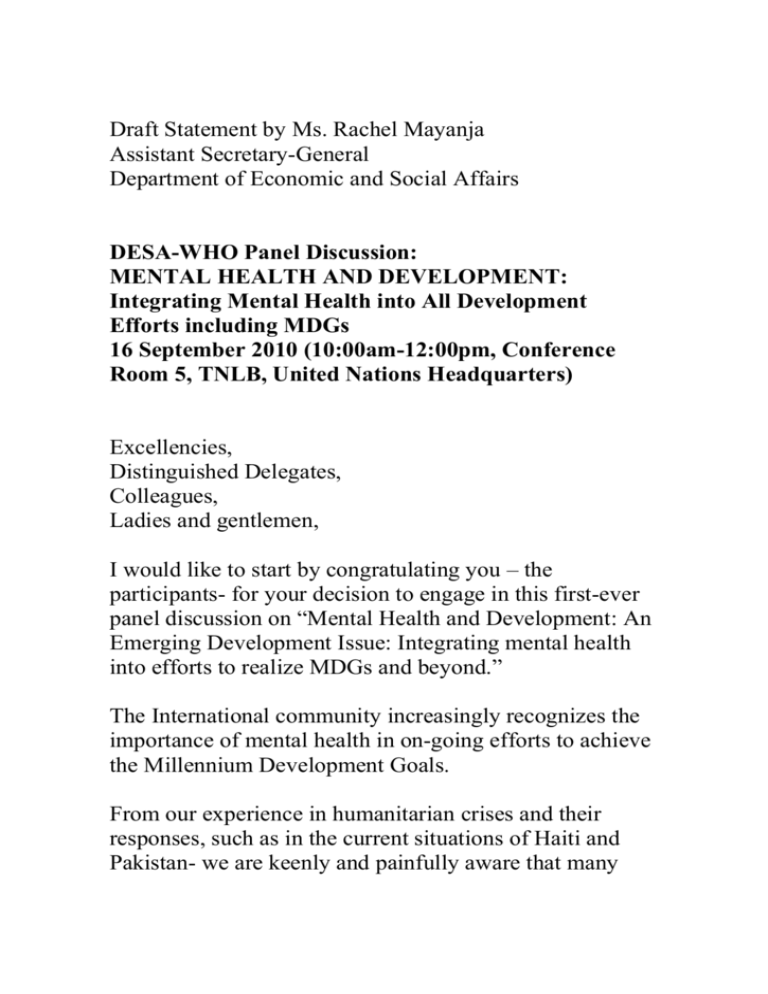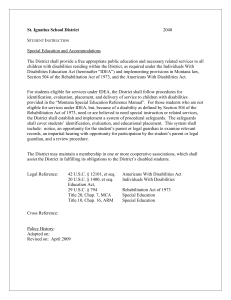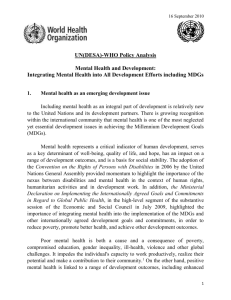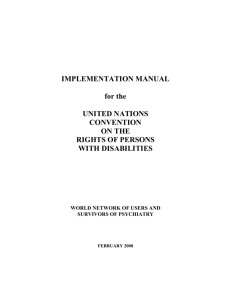Rachel Mayanjya - the United Nations
advertisement

Draft Statement by Ms. Rachel Mayanja Assistant Secretary-General Department of Economic and Social Affairs DESA-WHO Panel Discussion: MENTAL HEALTH AND DEVELOPMENT: Integrating Mental Health into All Development Efforts including MDGs 16 September 2010 (10:00am-12:00pm, Conference Room 5, TNLB, United Nations Headquarters) Excellencies, Distinguished Delegates, Colleagues, Ladies and gentlemen, I would like to start by congratulating you – the participants- for your decision to engage in this first-ever panel discussion on “Mental Health and Development: An Emerging Development Issue: Integrating mental health into efforts to realize MDGs and beyond.” The International community increasingly recognizes the importance of mental health in on-going efforts to achieve the Millennium Development Goals. From our experience in humanitarian crises and their responses, such as in the current situations of Haiti and Pakistan- we are keenly and painfully aware that many individuals, including persons with disabilities, experience fear, desperation, sense of loss, hopelessness, and sometimes these lead to depression, anxiety, or further disabling mental conditions. We know mental health is said to be one of the most critical indicators of human development, being a key determinant of well-being, quality of life, and hope for development. But now, I would like to ask the following questions- how much do we know about this critical issue- what could the available data and statistics and emerging trends tell us? What is happening on the ground to individuals affected by disabling mental health conditions? What could we do to address the adverse situation and take counter-measures? Experts tell us that mental health is both a cause and consequence of a number of complex factors, including poverty and social exclusion. We also come to know, that the impaired mental health could easily lead to the lack of access to employment and education, inequality, ill health and violence are associated with mental and psycho-social well-being of individuals. On the other hand, persons with mental and psychosocial disabilities represent a significant proportion of the world’s population. For example, depression is the leading cause of years lived with disability worldwide. They often suffer from stigma, prejudice and discriminations, due to widely held misconceptions about the causes and nature of mental health conditions. Again, we do not have enough empirical data on these issues. Shouldn’t we commit ourselves more on empirical studies on these issues? In addition, isn’t urgent attention and analysis required for mental health of women, children, young people and older persons with disabilities, among others? Continuing with more questions- how can we effectively address these mental health issues in the context of development. And most importantly, what kind of policy measures and programmes need to be adopted to improve the mental and psychosocial well being of individuals at national and local level? It takes more than a village to answer these questions! The adoption by the United Nations General Assembly of the Convention on the Rights of Persons with Disabilities in 2006 provided a momentum to highlight the importance of the nexus between disability and mental health in promoting human rights and development. The Conference of States Parties to the Convention just took place at the beginning of this month, involving more than 560 participants, representing governments, organizations of persons with disabilities and other civil society organizations and academic institutions, DESA being the Secretariat to this Conference, it seems clear to us that this type of multi-stakeholder forum could also address what should be done at the national and local levels to improve mental health situations as part of the implementation of the Convention and international development goals Excellencies, Distinguished Delegates, Our Department (DESA) through its Secretariat for the Convention on the Rights of Persons with Disabilities has been promoting the rights of persons with disabilities in all aspects of society and development, including persons with mental and psychosocial disabilities. Despite marked progress in awareness concerning the rights of persons with disabilities since the adoption of the Convention in 2006 we are still faced with many challenges and obstacles in mainstreaming the rights of persons with mental and psychosocial disabilities in development policies and programmes, including in the context of MDG implementation, monitoring and evaluation. As we all know, achieving the Millennium Development Goals is not an easy process. The international community will review the progress made so far and adopt strategies for implementation of the MDGs by 2015 during the MDG summit next week. The social and economic cost of mental health could be a cause of poverty, high unemployment rates, poor educational and health outcomes, among others. The available data shows that economic cost of mental health problems is enormous, while reasonable investment in mental health could contribute to improved mental health and well-being of individuals and productivity of society to advance development. And all these issues are directly linked with the achievement of the MDGs. Excellencies, Distinguished Delegates, Ladies and Gentlemen, Mental and psychosocial well-being is a critical aspect of development for our hope and future. Now, once again, I would like to reiterate the questions not only to the panellists but all the participants. : - How can we improve our knowledge base, on the status of mental health and development? How can we effectively address urgent issues concerning mental health and MDGs? I look forward to learning from discussions concerning these key questions in this groundbreaking effort. Thank you.











